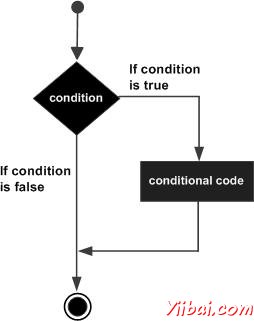D語言if語句
if語句由一個布林表示式後跟一個或多個語句。
語法
if語句在D程式設計語言的語法是:
if(boolean_expression) { /* statement(s) will execute if the boolean expression is true */ }
如果布林表示式的值為true,那麼程式碼的if語句內的模組將被執行。如果布林表示式計算為false,那麼第一組程式碼的if語句(右大括號後)結束後,將被執行。
D程式設計語言假定任何非零和非空值作為true,如果它是零或為null,則假定為false。
流程圖:

例子:
import std.stdio; int main () { /* local variable definition */ int a = 10; /* check the boolean condition using if statement */ if( a < 20 ) { /* if condition is true then print the following */ writefln("a is less than 20" ); } writefln("value of a is : %d", a); return 0; }
當上面的程式碼被編譯並執行,它會產生以下結果:
a is less than 20; value of a is : 10